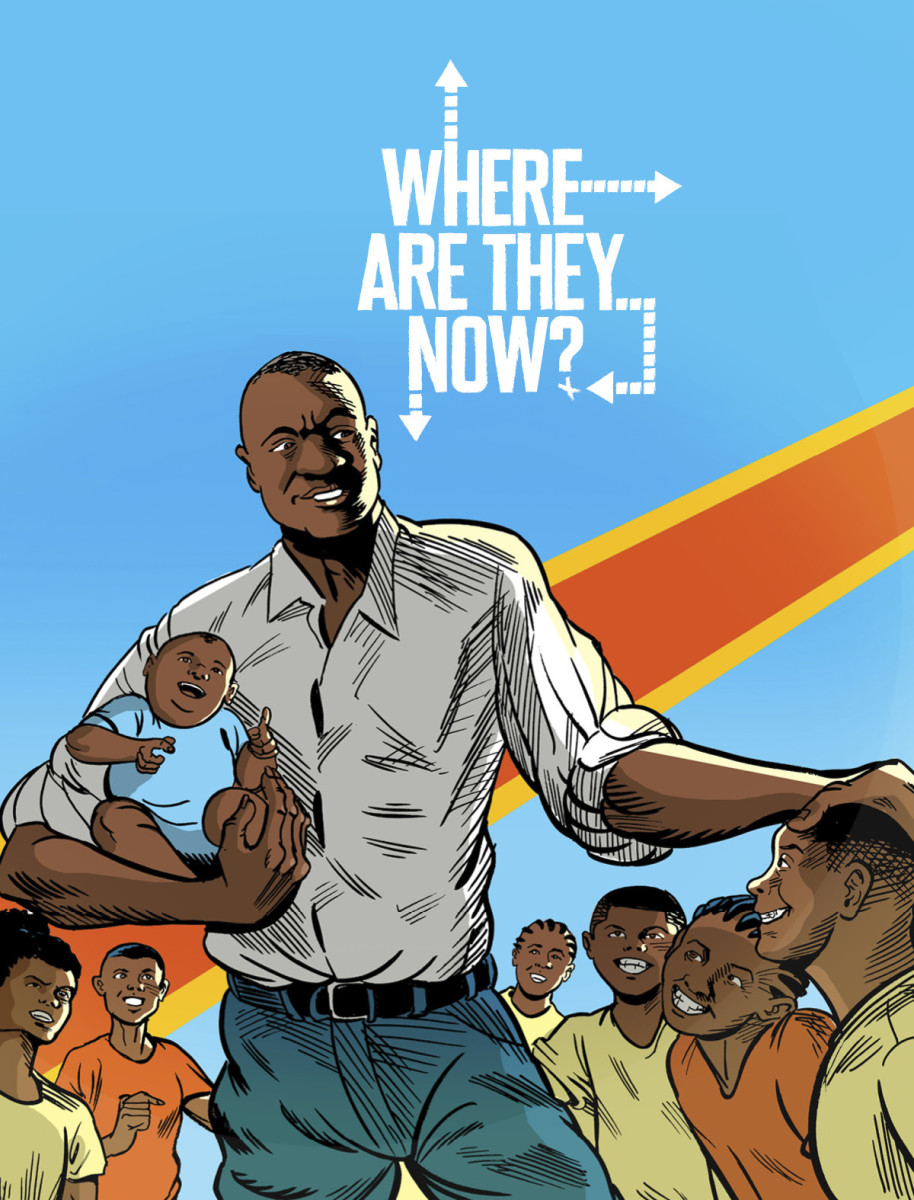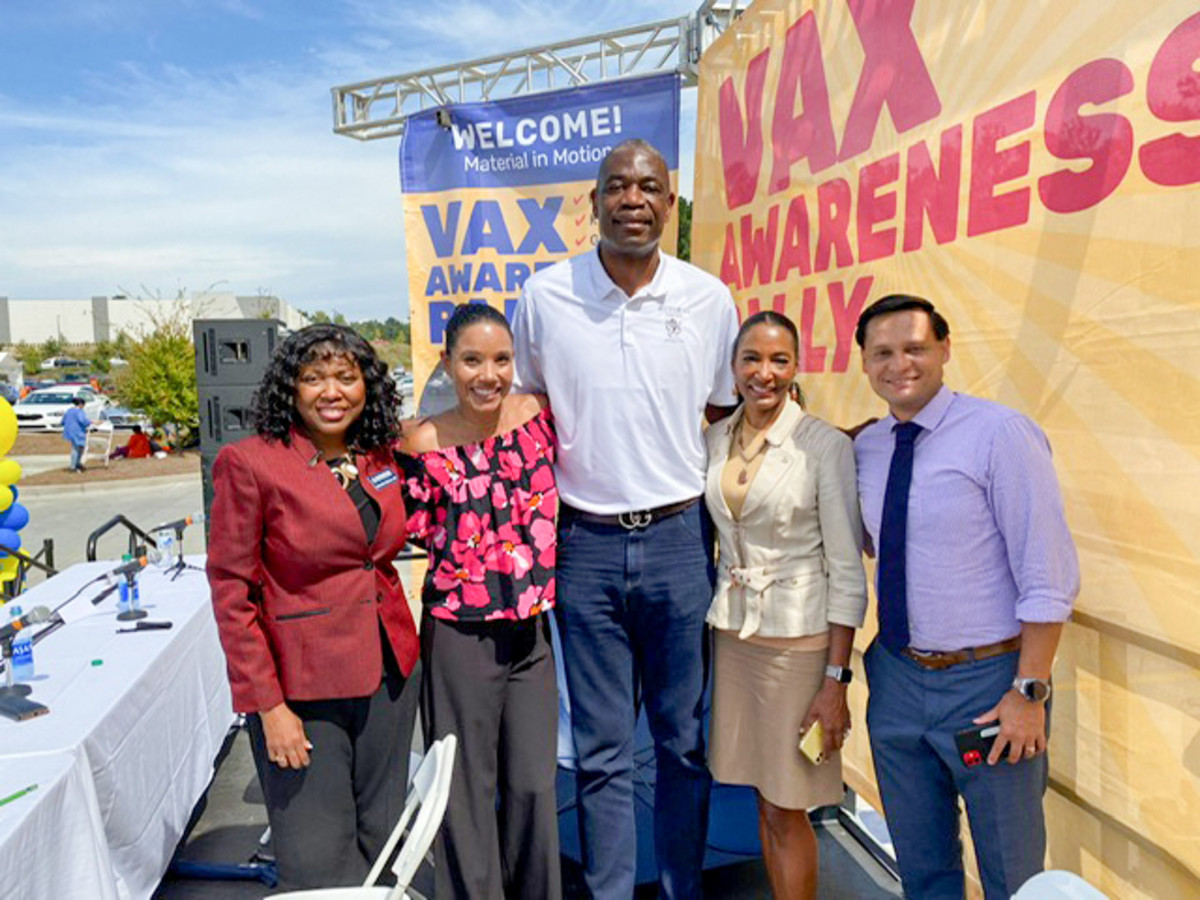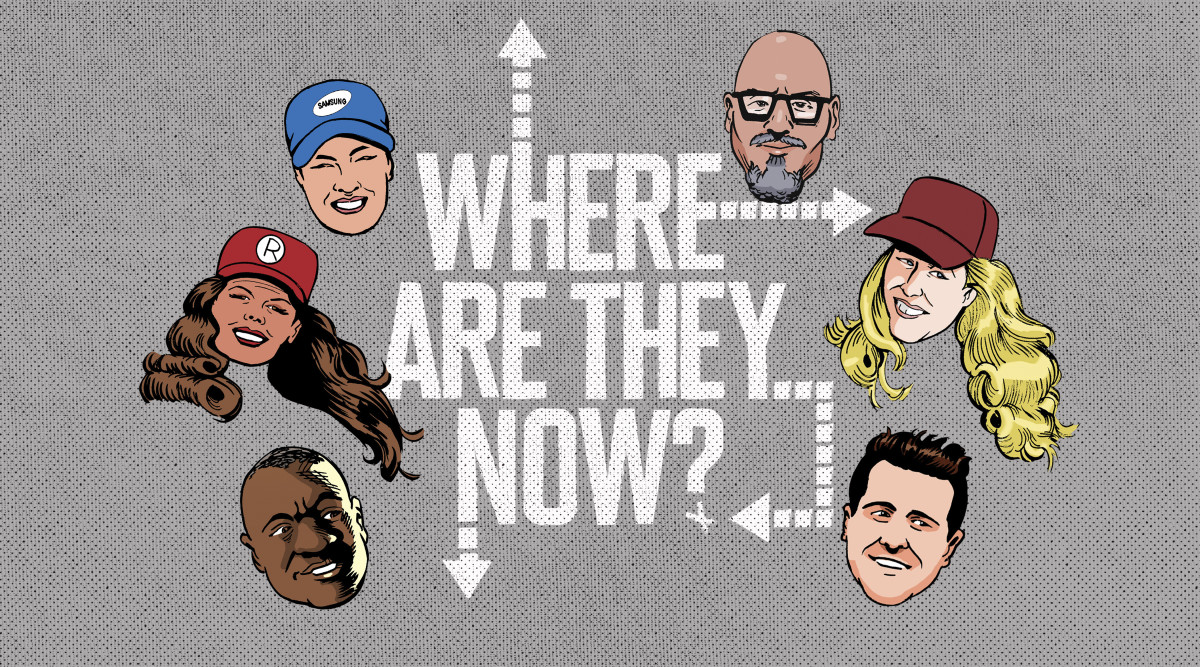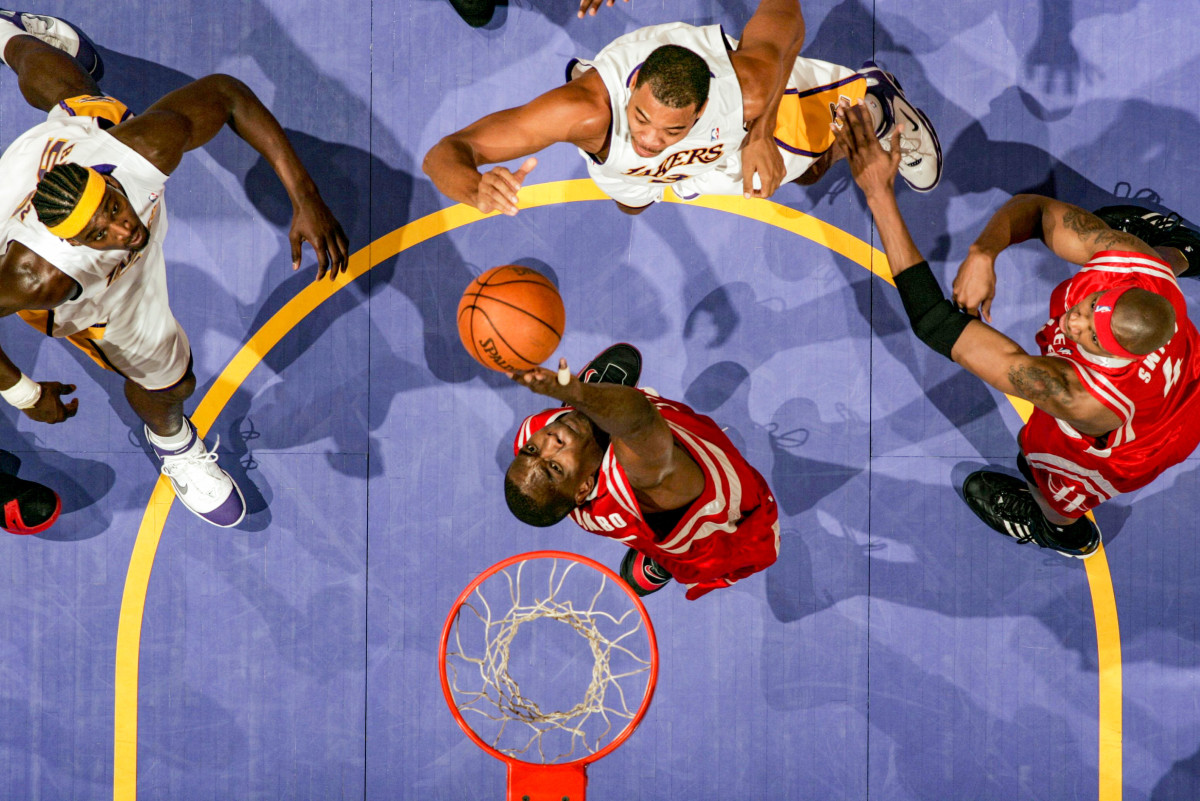Dikembe Mutombo Has Long Battled Disease in His Native Country. Then COVID-19 Hit His New Home.

Dikembe Mutombo died of brain cancer Monday at the age of 58. Here SI has republished a story from 2022, detailing his humanitarian efforts in his native Democratic Republic of Congo.
Each summer Sports Illustrated revisits, remembers and rethinks some of the biggest names and most important stories of our sporting past.
Contractors loading up on lumber and weekend do-it-yourselfers sorting through sconces at an Atlanta-area Home Depot last year encountered a head-turning anomaly: A 7'2" NBA Hall of Famer roaming the store’s orange-hued halls, his cart brimming with boxes, boxes—and more boxes—of N95 masks. Before each of his five trips to the Democratic Republic of Congo in 2021, Dikembe Mutombo ventured to a suburban strip mall and grabbed as many of the coronavirus-deterring tools as he could get his mammoth hands on—$20,000 worth, in total, he says—intent on shuttling them across the Atlantic and delivering them to his native country.
After his journey, the masks that once collected dust on Home Depot’s shelves were eventually affixed to the faces of nurses, physicians and patients at the hospital in the DRC named for Mutombo’s mother, Biamba Marie. In all, he spent nearly two months there in 2021, joining the country’s fight against COVID-19.
After 18 seasons spent wagging his finger under searingly bright arena lights in front of thousands of fans, he has devoted the subsequent 13 years to his life’s most important work—building a hospital and, later, a school, in the name of bettering the lives of his native country’s citizenry—through his Atlanta-based foundation. For Mutombo, a four-time Defensive Player of the Year who retired in ’09, the former endeavor was merely a worthwhile deviation that enabled the latter. “Basketball was a vehicle that I used to get me where I’m going,” Mutombo, now 56 and often besuited, says from his office’s glass-walled conference room. “The foundation is my life. It is my passion. … My inspiration in life is to improve the living condition of my people.”
Mutombo’s defining battle expanded to a two-front war in 2020 when the pandemic took the world hostage. Not only would he square off against a new pestilence in his homeland, another in a relentless string of them—malaria, polio, Ebola, measles—he would have to combat it in Georgia, his adopted home, where he spent nearly five seasons from 1996 to 2001 as the Hawks’ defensive anchor. When fellow 7-footer Rudy Gobert contracted COVID-19 on March 11, 2020, the NBA hastily shut down and the rest of the country soon followed suit, Mutombo realized the same terrors he’d grown up with had pierced his adopted home’s veil of safety. Fear and panic, though, didn’t grip him. Instead, having grown accustomed to the ravages of disease and death during his younger years and intent on not having to face them again, he called wealthy donors, bought masks in bulk, and donated time and money and meals to frontline workers.

Why, in middle age, having been an NBA luminary for more than two decades, having built a hospital named for his mother and a school named for his father, does he continue to try to solve such seemingly intractable problems? “He has a disdain for injustice,” says Dr. Groesbeck Parham, a Zambia-based physician who helped establish the gynecologic oncology department at Mutombo’s hospital in Congo. “I think he realizes how fortunate he is, and he has to pay it forward—and he does that very aggressively.”
Mutombo and civil rights leader Andrew Young spent a pair of afternoons last fall addressing a crowd on an outdoor stage in front of a Google hardware production facility where only 15% of the workforce had been vaccinated. The duo had ventured to Fairburn, Ga., a working-class town a half hour southwest of Atlanta, in hopes of boosting that rate, which lagged well behind state and national averages. As part of the event, Google offered free vaccinations on-site as well as a cash incentive—provided by the company—and the plant’s vaccination rate jumped by 30%.
Mutombo first crossed paths with Young when the NBA star paid for the Congolese women’s national basketball team to travel to the 1996 Olympics in Atlanta. He also happened to be a free agent that year and when he rubbed elbows at the Games with the likes of Young, John Lewis and Maynard Jackson, he found himself among peers—local icons who were happy to try to recruit him to Atlanta, noting that the city with a vibrant Black population could use another civil servant (and shot blocker) like him, intent on giving back to communities in need.
After events like those at the Google plant, Mutombo gladly poses for pictures with attendees, who seem eager to greet him and thank him for coming—his broad smile and bass-drum laugh often proving infectious—rather than push back on his message with any anti-vaccine rhetoric they may have encountered online.

Even Mutombo’s driver to one of the vaccination rallies hadn’t received the shot, but encouragement from the backseat proved enough to persuade him to roll up his sleeve. The driver also beckoned his wife, children and mother-in-law to come get their shots, too. “They say, ‘Why are you doing this?’ Mutombo recalls. “I tell them, ‘You’re part of my community. I want my community to be safe.’”
For Mutombo, protecting that community has taken many forms. He joined Anthony Fauci and second gentleman Doug Emhoff for an Instagram Live event last year to promote the importance of getting vaccinated. Mutombo’s foundation donated lunches to frontline workers at Phoebe Putney Memorial Hospital in Albany, Ga., which was one of the pandemic’s first epicenters and once boasted the country’s second highest per-capita case rate.
In May 2020, in the thick of the pandemic’s first wave, Mutombo also visited Grady Memorial Hospital in Atlanta. ICUs in one of the city’s largest hospitals were overflowing; thousands there had been treated. He met with frontline workers outside the hospital doors and distributed warm meals; the encounter was a welcome respite from the carnage inside, but he could see the horrors reflected in their eyes. In ’21, when he was vaccinated and cleared to return to Africa after a year spent raising funds from afar amid travel restrictions, he didn’t see that same shell-shocked look on the faces of his hospital’s staff. Not because the pandemic hadn’t touched them, but because preventable death there has long been maddeningly routine. “Maybe when you’re brought up in a community where you see death every day,” Mutombo says, “it becomes a normal part of life.”
Like most people in Congo, death was omnipresent in Mutombo’s early years. Ask him to articulate his country’s problems—and potential solutions—and his responses tend to be peppered with detail, but encourage him to revisit his formative years in a working-class family in Kinshasa and he falls silent, offering only that he lost “so many” friends while refusing to delve into those grim details. The median age in Congo is 16.7, compared to 38.5 in the United States, so seeing schoolmates felled by the likes of malaria and malnutrition proved inescapable. To spare others comparable pain, he hoped to one day become a doctor. Mutombo’s father, Samuel, was educated in Europe and returned to Congo to work as a teacher and school administrator rather than pursue a more comfortable life abroad—an example that gave his tallest son purpose.
Because of that height, however, Mutombo spent his time at Georgetown from 1987 to ’91 studying opposing Big East centers instead of anatomy. Though he never became a physician, he now routinely seeks their counsel.
Most public health experts assumed COVID-19 would ravage the region due to persistent poverty and a dearth of medical resources. Yet Africa, while comprising more than 17% of the world’s population, has accounted for roughly only 3% of worldwide COVID-19 deaths to date. “At the beginning of the pandemic, there were pictures of overflowing ICU beds, refrigerated trucks being parked outside hospitals to deal with the number of deaths,” says Dr. Opeayo Ogundiran, the World Health Organization’s epidemiology pillar lead for regional COVID-19 response in Africa. “We’ve not seen those types of pictures in Africa. The big question would be, ‘Why?’”

Read More Where Are They Now? Stories
The reasons are manifold. There’s a chance many Central Africans have been widely exposed to a coronavirus similar to COVID-19 in the past and developed a measure of immunity. The consistently hot weather may have tempered the virus’s impact; people there spend their lives largely outdoors—even parts of Mutombo’s hospital are open-air rooms.
Patients who arrived at Mutombo’s facility with COVID-19 symptoms or who tested positive were referred to a larger infection center in Kinshasa, such protocols long established in a continent where coping with life-threatening viruses has long been immutable. Congo and other Central African nations are equipped with robust systems to handle pandemic-level events—the protocols and personnel in place to combat Ebola, for instance, were mobilized when COVID-19 reached the continent. Mutombo experienced that level of life-saving vigilance firsthand last year: During a trip, Mutombo remembers leaving his hospital after nightly COVID-19-related lockdowns had begun. He had to pass through 15 checkpoints as he worked his way back to his hotel, but was happy to endure the hassle for the sake of his community.
Still, the coronavirus wrought relative havoc. More than 30 members of Congo’s parliament were felled by COVID-19, and the country has reported nearly 1,400 COVID-19-related deaths (certain to be an underestimation due to poor data collection). Hold that, though, against the tens of thousands of Congolese who succumb to malaria every year—many of them children—and COVID-19 seems less consequential. “When you walk through the streets of Central Africa and ask people what their biggest concerns are, maybe the pandemic wouldn’t be top of the list,” Ogundiran says. “It wasn’t unprecedented to have a disease ravaging communities and people having to rush to hospitals. It wasn’t the newest thing.”
In the United States, COVID-19 vaccines are readily available at pharmacies or grocery stores; in Congo, people must venture to medical facilities like Mutombo’s to receive their doses, which can require a full day of travel on foot or by motorcycle. As such, Congo’s vaccination rate ranks among the lowest in the world, and vast quantities of vaccines have had to be destroyed because they lost their efficacy or were given away to countries that would put them to use. In March 2021, for instance, Congo received 1.7 million doses of AstraZeneca’s vaccine, but handed 1.3 million over to other African countries. Companies have even begun flying drones equipped with hundreds of vaccine doses into villages that can’t be accessed by road.
Dr. Ogundiran, of the WHO, says those practical barriers have created a new form of hesitancy, not one commonly experienced in the U.S. While misinformation is an issue in Central Africa, it’s not nearly as prevalent as in America. Access, not the privilege of doubting science amid mass death, remains the primary barrier. The country has the third-largest population of impoverished people globally; as of 2018, an estimated three-quarters of Congo’s citizens lived on less than $1.90 per day, the international poverty line. For them, a day without work often means a day without food. Consequently, as of today, fewer than four million doses have been administered in a country of more than 100 million.
When vaccines first reached Congo last spring, Mutombo’s hospital set up makeshift inoculation tents, where he filmed his brother and a foundation employee as they received their shots, cheering them on in hopes of encouraging the masses to do the same. (Mutombo had previously recorded himself getting his first shot in the U.S. and posted it to social media.) The hospital provided roughly 100 vaccines a day to those who could afford to set the time aside to get the shot; helpful, but a relative blip in the country’s efforts to close its vaccine gap, Mutombo knows. “It’s up to us leaders of the community to go in and try to spread the good word,” he says. “We have a lot of work to do.”
During five seasons with the Rockets at the end of his career, Mutombo spent team flights neither playing cards nor watching movies, but instead plotting the construction of what would become a 300-bed hospital in Masina, an impoverished district in Congo’s largest city, Kinshasa. Yao Ming, whose foundation would go on to help fund educational initiatives for children in rural China, watched him work from across the aisle.
Mutombo announced his intentions to build the hospital in 1997, though its doors didn’t open for a decade. In the intervening years, he navigated a regime change and spools of red tape, donating $15 million of his own money toward the initial $29 million cost and working with confidants to recruit hundreds of doctors and nurses to staff the hospital. Initially he went to friends and teammates in the league: Players, in sum, donated $500,000; owners another $700,000, though he soon learned then that he had to start looking to business executives with deeper pockets and longstanding philanthropic missions to find the sort of funding he’d need to sustain such an ambitious enterprise.

Despite the obstacles, he had a deeply personal reason to ensure the hospital didn’t fizzle out as a stack of papers on a team plane. Mutombo’s mother, Biamba Marie, perished in 1998 when she had a stroke but couldn’t reach a hospital for treatment due to a curfew imposed in the wake of a bloody civil war. The anguish of losing her in such a preventable manner motivated him to complete the hospital that would one day be named for her, even if it meant paying farmers who had squatted on the property to vacate the land and negotiating with an ever-changing cast of politicians and local officials. “People forget about those 10 years,” he says. “A thousand times I thought about quitting.”
Luckily for the people of Masina, Mutombo didn’t relent. Today, locals have quick—and free—access to an emergency room, a range of surgical procedures, an intensive care unit and burgeoning treatments for HIV, AIDS, cancer and malaria. Just shy of 1 million patients have passed through the facility’s doors since it opened. Still, “we have a long way to go,” Mutombo says, citing high mortality rates in the country for children and expectant mothers.
Mutombo and his team have recruited several cancer specialists from U.S. medical schools to train the hospital’s staff. Cervical cancer mortality rates in Congo are dire; with more than 7,000 people diagnosed every year and 5,500 deaths, it’s the most common form of cancer among adults in the country. Most die without ever receiving treatment because radiation and chemotherapy tend to be scarce. When Dr. Parham first approached Mutombo in 2017, citing his goal to bolster cancer treatment throughout the continent, Mutombo cut his presentation off after a few minutes. “Women, cancer,” Mutombo told the doctor, “just tell me how much it’s going to cost.”
When Parham arrived at Mutombo’s hospital soon after their initial meeting, he was stunned to see a facility so well equipped and well managed that was accessible to even the region’s poorest residents. Originally from the U.S., Parham has been working in Africa for more than two decades and says it’s difficult to find clinics that offer such an array of services to the public, particularly at little to no cost. “On the African continent,” Parham says, “it was way above the standard.”
Today, not only does the hospital regularly administer chemotherapy to treat breast and cervical cancer, but it boasts two dedicated cancer surgical units and an advanced CT scanning machine that is essential to doctors as they seek to diagnose a range of cancers, a rarity for a clinic of its size and location. It’s also home to a compact chemical analyzer—not often found in free clinics like Mutombo’s—which ensures advanced lab tests can be done in-house and diagnoses rendered quickly.
The facility has also offered a slew of other services to those in need, like providing more than 10,000 complimentary hearing aids or performing volunteer cataract and cleft palate surgeries. Older patients who once dealt with debilitating arthritis can be seen shuffling with walkers through the hospital’s halls, open breezeways or a grassy courtyard as their artificial joints settle into place after free procedures. All are essential services that were scarce in the region before Mutombo’s hospital opened.
In 2019, a breast cancer patient at the Mutombo hospital became the first in the DRC to receive a special form of chemotherapy and a life-saving, ultrasound-guided lumpectomy. When the hospital held its first free cervical cancer screening event, it was equipped to handle roughly 1,000 patients over the course of the week: More than 8,000 lined up the first morning. Parham remembers watching the masses swarm Mutombo: “You would have thought Michael Jackson had walked out on the veranda,” he says. “Something that has always stuck with me was his deep degree of humility and gratefulness.”
The Dikembe Mutombo Foundation’s office sits on the 10th floor of an unremarkable office tower north of Atlanta, and his unmistakable voice can often be heard rumbling amid the white noise. Even if the words—spoken in any of nine languages—are muffled by a door, their vibrations echo down the hall and into the office’s lobby, where a collection of black-and-white photos, bathed in light, of children and physicians in the DRC serves as the room’s centerpiece. At the heart of that collage hangs an image of Mutombo gently raising a girl’s chin as she stares back in awe. A famous portrait of him in a Nuggets uniform, holding a ball aloft after a 1994 playoff upset over the top-seeded Seattle SuperSonics, is relegated to a side wall.
Mutombo opted to house his foundation’s offices in a 17-story building not because it afforded him a view, but because office towers like those tend to be replete with deep-pocketed corporations—and he could find himself on elevator rides with people who hold the purse strings. After the mirrored elevator doors slide shut, the subsequent close-quarter interludes have proven fruitful: Two of his foundation’s key donors happen to be headquartered in his building.

He no longer seeks financial help from his NBA brethren. Instead, he’s a constant—and hard-to-miss—presence at gatherings of prominent business and political leaders held by the likes of Bloomberg, the Clinton Global Initiative and Goldman Sachs. He has dined with the Waltons in Bentonville, Ark.; befriended a Koch brother; visited with former President Obama at his foundation in Chicago. Still, “You get tired; you get sick and tired of asking people for money,” he says. “It’s total fatigue.”
Amid the pandemic, though, Mutombo started dialing connections throughout the business world who he knew were trapped at home and eager to put their money to use. Along with his own contributions, the funds he raised subsidized the construction of a $4 million school in Tshibombo village, near where Mutombo’s parents were raised. It’s named for his father, Samuel, who was an educator and school administrator for 37 years. Students first stepped inside last November.
Mutombo’s foundation not only funded construction, but it provides bus transportation, two meals a day and covers the cost of keeping the school tuition-free for its 420 elementary- and middle-school students. Mutombo hopes to wield education as a means of preventing the village’s girls from getting married in their teens and its boys from idling in the streets—all too common in the area, he says. Many there had never seen a bus, and now they have access to a fleet of crisp white ones that spare them from traversing hostile terrain, laden with snakes, every morning. The school has electricity, which some of the students had never encountered. “When they go home,” Mutombo says, “they go home to the dark.”
As the worst of the pandemic wanes, the next task Mutombo has set for himself is making the school financially self-sufficient, much like the hospital, which is subsidized by fees paid by local companies in exchange for providing health care to their workers. He’s mulling a model in which the foundation would dole out loans to seed small businesses in the village and then use the subsequent interest payments to fund the school. He says the school has already spurred others in the region to invest in water sanitation and women farmers, which is precisely the sort of ripple effect he hopes each new initiative might trigger. “I'm only one person,” he says. “I can do this, but the question is becoming until when?”
He often speaks through a smile and punctuates his thoughts with that thundering laugh, but his eyes draw tight and he rubs his temples with spindly fingers when he mulls the future. He understands benefactors like him will come and go, but the only way for the people of Congo to weather storms like COVID-19—and even more perilous day-to-day living conditions—is if he leaves behind institutions that will outlast him.
For that, he needs to inspire people not only with deep pockets but with “good hearts,” he says, to carry on his work. Fortunately for the people of Congo, their most famous son seems to possess both and remains committed to putting them to use for good. The WHO’s Ogundiran, who works in the region, has never met Mutombo but reveres him—and insists the people of the Congo do, too. “He’s always been one of those people that have continued to bring immense light to the continent. If only the number of people in the world with that type of a voice used it the way he does,” Ogundiran says, “we would live in a completely different world.”
•
•
•
